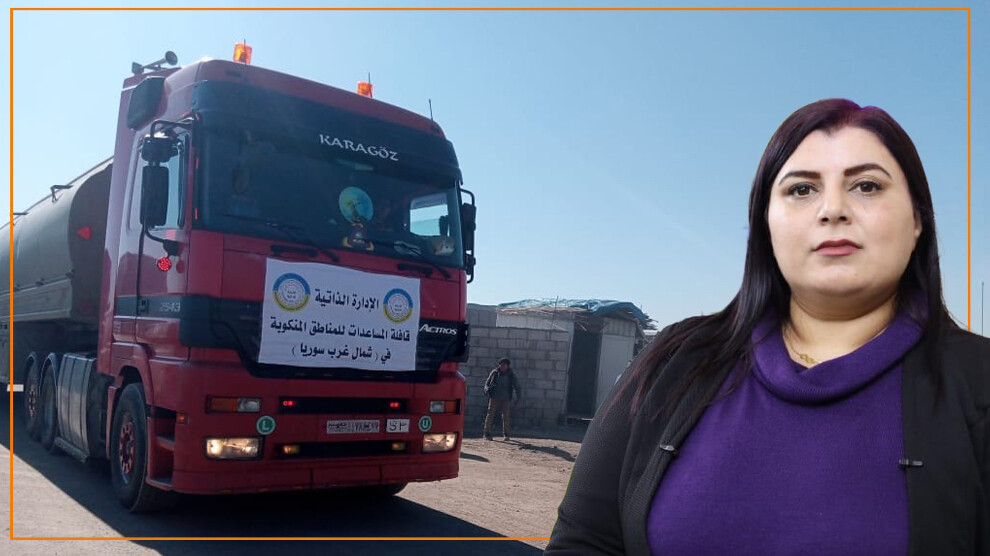The Autonomous Administration of North and East Syria (AANES) has accused the governments in Ankara and Damascus of blocking aid deliveries to the Syrian earthquake zones. An aid convoy with around 100 vehicles, including dozens of tankers with fuel as well as trucks with food, drinking water, medicine and warm clothing is currently waiting in the village of Umm al-Julud between Manbij and Jarablus for permission to cross the informal border between the autonomous region and the Turkish occupied zone, said the executive council chairwoman Bêrîvan Xalid in Raqqa on Thursday. The Kurdish politician demanded unhindered access to the Syrian earthquake zone. Urgently needed aid for the civilian population must reach the earthquake victims quickly and directly, regardless of political and ideological differences or war-related interests, she said, adding: "Emergency aid must not be politicised."
Meanwhile, the total death toll following the devastating earthquake in the Turkish-Syrian border region has risen to almost 20,000 in both countries. In Turkey alone, at least 16,546 people died and more than 66,000 were injured, according to the latest figures. In Syria, 3,317 people have died and more than 5,000 others are injured, according to the latest figures. The 7.8-magnitude earthquake with its epicentre in the province of Maraş shook the Turkish-Syrian border region early on Monday. It is feared that the number of victims will continue to rise.
In Syria, five provinces were affected by the quake: the jihadist-controlled Idlib, the Turkish-occupied region of Afrin and the areas around Aleppo controlled by the Assad regime. The quake was somewhat less devastating in the three provinces of Latakia, Tartus and Hama, which are also under regime control.
In Afrin, the district of Jindires was hit particularly hard. Rescue teams from the Turkish state are searching for people trapped there. However, they mainly take care of the trapped relatives of the jihadists who settled there after the occupation five years ago, while the original population is neglected. This also applies to the medical care of injured people in the hospital wards in the Turkish occupied zone.
In the self-governing districts of Sheikh Maqsoud and Ashrafiyah in northern Aleppo, six people were killed as a result of Monday's earthquake, including several young children. Fearing aftershocks, 1,200 families have fled to the Shehba region, where hundreds of thousands of internally displaced people from Afrin have been living since 2018. They are being cared for by AANES in reception camps and in villages in Sherawa district, which is not yet fully occupied by Turkey. However, the humanitarian situation in Shehba has been extremely precarious for months anyway due to an embargo imposed by the Assad regime. Part of the humanitarian aid held up in Manbij is also supposed to arrive there.
Meanwhile, AANES has reiterated its call on the United Nations (UN) to work for the immediate opening of all border crossings into Syria. "The international community must influence the governments in Ankara and Damascus to open more border crossings as quickly as possible and to ensure that urgently needed aid reaches the people in the disaster area," said Bêrîvan Xalid. In particular, the Syrian-Iraqi border crossing Til Koçer (Al-Yarubiyah) must be opened immediately for humanitarian aid deliveries, she stated.
The Til Koçer border crossing, controlled by the Iraqi army, was closed in 2018 at Russia's insistence by a decision of the UN Security Council. Even now, the Assad regime and Russia, as Syria's protecting power, are blocking the opening of the border crossings. Bab al-Hawa is the only open border crossing from Turkey to Syria out of the original four. Today, six trucks with aid from the United Nations crossed the border. However, these are aid deliveries that were already planned before the earthquake and were only delayed by it.
In the meantime, the Kurdish Red Crescent, Heyva Sor a Kurd, and the Euphrates Region Health Board provide health services to the people of Kobanê in aid tents.
Each of the 6 health teams organized by the Euphrates Region Health Board has medical personnel specialized in internal diseases, heart and children.
Three ambulances were allocated to Heyva Sor Kurd and six others to the Health Board to serve the citizens in the tents.
While emergency teams help the people with limited opportunities and medicines provided by the Health Board, no humanitarian organization has delivered aid to the region so far.
Nihad Çol Beg, emergency service member of the Euphrates Region Health Board, said: “We have been mobilized since the first day of the earthquake. Medical personnel are ready for emergency situations and to protect the public. Unfortunately, no state or organization has helped us so far.”
Çol Beg added: “Six medical teams are checking the tents in the evening. Each team consists of medical personnel specialized in internal diseases, heart, gynaecology and children. Sick people are being treated in ambulances.”
The Autonomous Administration of the Euphrates Region has set up six tents in Kobanê to provide health services after the earthquake in the region. The earthquake injured three people in Kobanê and 57 people in North and East Syria.















